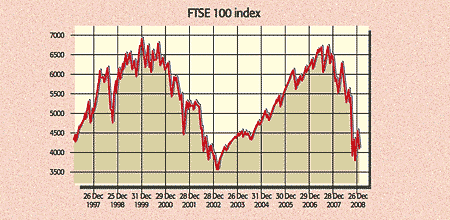Get the latest financial news, insights and expert analysis from our award-winning MoneyWeek team, to help you understand what really matters when it comes to your finances.
You are now subscribed
Your newsletter sign-up was successful
Want to add more newsletters?
"Stocks always go up over the long term" is one of the oldest investment mantras in the book. But the long term can end up being very long indeed. The FTSE 100 fell by 28% in the decade to the end of last year. The trouble was that, late last century, investors failed to "buy low"; indeed, they bought at record valuations. And "valuations, rather than macroeconomic conditions or the progress of corporate profits, are the core determinant of equity-market returns", says Tim Bond of Barclays Capital.
Markets tend to meander in long-term cycles with valuations moving from extremely high to extremely low. These valuation up-and-down cycles are known as secular, or primary, bull and bear markets. These long-term bulls and bears typically last around 15 years or so. In the US, which tends to set the tone for world stocks, the S&P 500's p/e went from dirt-cheap single digits all the way to a record 44 in 2000. The long-term average is 15. In the secular bear markets, stocks fall or drift sideways overall (but often post major rallies and setbacks in the process) as earnings gradually catch up with valuations. Witness the 1966-82 bear, which managed to post some spectacular market rallies, going beyond the 1966 level as valuations continued to slide, interrupted by occasional upticks, to single digits. Overall, however, stocks went nowhere (and were sharply down after inflation).

It's been a similar story since 2000. Valuations have gradually slid, despite the big bear market rally of 2002-07. At its late 2002 low the p/e was 25, but at the peak of the rally in 2007 it stood at 21. "Classic valuation mean reversion" is occurring, as Adam Hamilton says on Zealllc.com. But this secular bear isn't over yet. The S&P 500 is on a p/e of around 18, still above average and a far cry from the single-digit level that presages the start of a secular bull.
Try 6 free issues of MoneyWeek today
Get unparalleled financial insight, analysis and expert opinion you can profit from.

Sign up to Money Morning
Don't miss the latest investment and personal finances news, market analysis, plus money-saving tips with our free twice-daily newsletter
Don't miss the latest investment and personal finances news, market analysis, plus money-saving tips with our free twice-daily newsletter
Britain also seems to be grappling with a secular bear market, with a similar trading pattern to US stocks since 2000, while the 2003-07 bear market rally did not begin from the historically cheap levels that imply a new secular bull. Valuations are cheaper than in the US, with the FTSE 100 on a p/e of around nine. But European p/e ratings have not yet hit bombed-out early 1980s levels. Given all this, and the grim outlook for stocks, the long-term bear trend is unlikely to be over yet although of course that doesn't rule out some decent rallies in the meantime.
Get the latest financial news, insights and expert analysis from our award-winning MoneyWeek team, to help you understand what really matters when it comes to your finances.
MoneyWeek is written by a team of experienced and award-winning journalists, plus expert columnists. As well as daily digital news and features, MoneyWeek also publishes a weekly magazine, covering investing and personal finance. From share tips, pensions, gold to practical investment tips - we provide a round-up to help you make money and keep it.
-
 Rachel Reeves's Spring Statement – live analysis and commentary
Rachel Reeves's Spring Statement – live analysis and commentaryChancellor Rachel Reeves will deliver her Spring Statement on 3 March. What can we expect in the speech?
-
 March Premium Bonds jackpot winners revealed – did you win £1 million?
March Premium Bonds jackpot winners revealed – did you win £1 million?Over two million historic Premium Bonds prizes are still waiting to be claimed, according to NS&I

